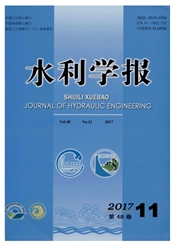

 中文摘要:
中文摘要:
已有的试验研究表明,不同加载速率下,饱和混凝土中的自由水对其力学性能有着不同的影响,与干燥混凝土相比,准静态荷载作用下饱和混凝土的抗压强度有所降低,动力荷载作用下饱和混凝土的抗压强度增高的较多。本文在翼型裂纹的基础上,考虑裂纹之间的相互作用、裂纹扩展速度对应力强度因子及孔隙水压力对裂纹扩展的影响,利用弹性断裂力学理论探讨了饱和混凝土的静、动力抗压强度变化机理并建立了理论模型。分析认为,慢速加载时,裂纹中的自由水可以达到缝尖,自由水的楔入作用加速了裂纹的扩展,降低了混凝土的强度;快速加载时,裂纹中的自由水较难达到缝尖,受负的孔隙水压力和自由水黏度及Stefan效应影响,饱和混凝土的动力抗压强度升高。模型计算与试验结果较为一致,表明本文理论模型可以较好地反映饱和混凝土静、动力抗压强度的变化机理。
 英文摘要:
英文摘要:
The existing experimental data indicate that free water in saturated concrete has different effects on mechanical properties of concrete under different strain rates. Comparing with dry concrete, the static compressive strength of saturated concrete may decrease, but the dynamic compressive strength will increase remarkably. A model based on the elastic fracture mechanics is established to analyze the mechanism of these changes of concrete strength due to saturation. In the model, the interaction between micro cracks and different effects of pore water are taken into account. The analysis shows that when loading rate is slow the free water in crack may reach the tip and the wedge effect of water accelerates the expansion of the crack causing the reduction of concrete strength. Whereas, when loading rate is fast the free water in crack will not be able to reach the tip. Due to the combined positive of pore water pressure, viscous of water and Stefan Effect the dynamic compressive strength of concrete will be enhanced. The calculation result is in good agreement with the experimental data.
 同期刊论文项目
同期刊论文项目
 同项目期刊论文
同项目期刊论文
 期刊信息
期刊信息
